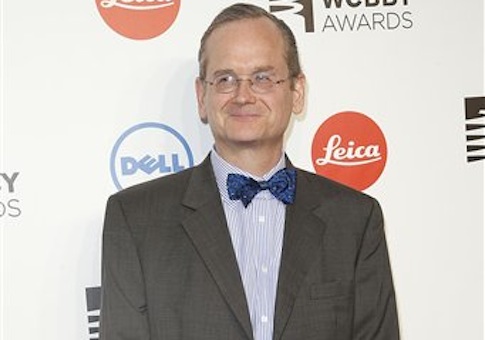A leading campaign finance reformer admitted defeat on Wednesday after spending more than $1.6 million on a Senate candidate who garnered less than a quarter of the primary vote.
Jim Rubens, a Republican Senate candidate in New Hampshire, received just 23 percent of the vote in Tuesday’s primary, losing to former Massachusetts Sen. Scott Brown, who will challenge Sen. Jeanne Shaheen (D.) in November.
Rubens’ poor showing was a black eye for Harvard University professor Larry Lessig and his Super PAC, called Mayday. The group backed Rubens with more than $1.6 million in independent expenditures.
"We lost. Badly," Lessig said on his blog on Wednesday morning. "In the end, the burden of this mistake rests with me, and me alone."
"Our first poll found our candidate with 9 percent of the vote," Lessig explained. "I knew we had to take on some unwinnable races—and win them. But by failing now, we have made the others harder. I should have accepted the advice not to take on that risk."
Lessig has called Mayday the "Super PAC to end Super PACs," inviting charges of hypocrisy from the campaign finance reform advocate’s critics.
The idea was to elect like-minded federal legislators, Republican and Democrat, who would vote for campaign finance reform legislation such as the radical constitutional amendment currently under consideration in the Senate.
Mayday has also spent money in support of Rep. Carol Shea-Porter (D., N.H.), Rep. Walter Jones (R., N.C.), and Arizona state representative Ruben Gallego (D.), who is running for a House seat in that state.
Lessig’s failure could spell trouble not just for his group’s efforts to elect those and other candidates, but also for the larger campaign finance reform movement.
His effort was seen as the vanguard of an effort to limit Americans’ ability to spend freely on communications expressing their views on policy and politics.
Lessig hoped that his attempts to sway a few elections would show "why people will vote on the basis of this issue and why they’ll kick people out on the basis of this issue."
However, even in populist New Hampshire, Republican voters chose the candidate that they felt could best challenge the state’s incumbent Democratic senator. Campaign finance did not turn out to be a particularly compelling issue for those voters.
"Mayday PAC, with it's twee, precious, self-righteous circle-jerking didn't do anything except run donor money through an industrial shredder," said Republican strategist Rick Wilson of the effort.
"They didn't understand that campaigns are about issues that move and motivate people, and that creating that motivation de novo in a political environment where real, pressing issues are on the minds of voters is a fool's errand. In a moment of peace, prosperity, and international calm, you might be able to sell people on luxury issues like this. As it is, voters greeted Mayday with the collective shrug its weak campaign deserved."
Notably, even Mayday-backed Gallego does not list campaign finance reform as one of his major issues on his campaign’s website.
While Lessig and others bill the campaign finance reform effort as nonpartisan, Mayday’s backers are anything but.
They include liberal activist group MoveOn.org, which gave $142,329.63 last month, Democracy Alliance donor Steve Susman, who gave $50,000, and Amanda Hanley, co-chair of the Natural Resource Defense Council’s Midwest Council, who chipped in $10,000.
Despite his bipartisan portfolio of candidates, Lessig has been explicit about the inherently ideological nature of his campaign finance reform efforts. Those efforts are necessary, he has said, to advance key liberal policy priorities.
"If money didn’t buy results in Washington," he said in 2012, it would be much easier for environmentalists to shepherd climate legislation through Congress.
Like Lessig, backers of a constitutional amendment proposed by Democrats this week to limit First Amendment protections on political speech admit that the measure is designed to make it easier to enact key parts of the Democratic Party’s agenda.
"If people think this is some kind of esoteric issue, not related to jobs and the economy and wages and women’s rights and income and wealth inequality and healthcare and global warming, you are deadly wrong," said Sen. Bernie Sanders (I., Vt.), a major supporter of the measure, at a Monday press conference.
